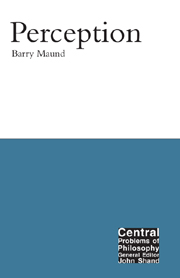Book contents
- Frontmatter
- Contents
- Preface
- 1 The philosophy of perception
- 2 A theory of natural realism
- 3 Theories of perceptual experiences
- 4 Representationalism: representations as natural signs
- 5 Natural realism: Putnam, Austin and Heidegger
- 6 Perception: the argument from illusion
- 7 The phenomenal and phenomenological senses of “looks”
- 8 Types of perceptual content
- 9 The representationalist–intentionalist thesis
- 10 Adverbialist accounts of perceptual experience
- Conclusion
- Notes
- References
- Index
9 - The representationalist–intentionalist thesis
- Frontmatter
- Contents
- Preface
- 1 The philosophy of perception
- 2 A theory of natural realism
- 3 Theories of perceptual experiences
- 4 Representationalism: representations as natural signs
- 5 Natural realism: Putnam, Austin and Heidegger
- 6 Perception: the argument from illusion
- 7 The phenomenal and phenomenological senses of “looks”
- 8 Types of perceptual content
- 9 The representationalist–intentionalist thesis
- 10 Adverbialist accounts of perceptual experience
- Conclusion
- Notes
- References
- Index
Summary
On the face of it, we can distinguish between the phenomenal character of perceptual experiences, and their intentional (representational) content. There are, as we have seen, however, two very different ways we might construe the phenomenal character. On one theory, to acknowledge the phenomenal character of our experiences is to acknowledge the existence of intrinsic qualities of the experiences (or of phenomenal items contained in the experiences), qualities that are accessible to introspection, and to phenomenological descriptions. The phenomenal character, on this account, consists of intrinsic qualities of subjective experiences, that is, of what are sometimes called “qualia”. Or so it seems. There is, however, an alternative way of construing the phenomenal character of experiences that does not admit the existence of qualia, or such intrinsic phenomenal qualities. On this account, the phenomenal character is analysed in terms of the representational character, that is, the representational content, of the experiences. Almost everyone accepts that, in some sense, perceptual experiences have representational (intentional) content, but what is at issue is whether there is, in addition, phenomenal character to the experiences.
The representationalist thesis, or the intentionalist thesis, as it is sometimes called, is that we are, in normal perception, not aware of the intrinsic qualities of experiences; we are instead aware of those objects and their qualities that are specified in the content of our experiences. One major proponent of the representational theory of phenomenal character is Dretske, whose views we looked at briefly in Chapter 8.
- Type
- Chapter
- Information
- Perception , pp. 165 - 192Publisher: Acumen PublishingPrint publication year: 2002

